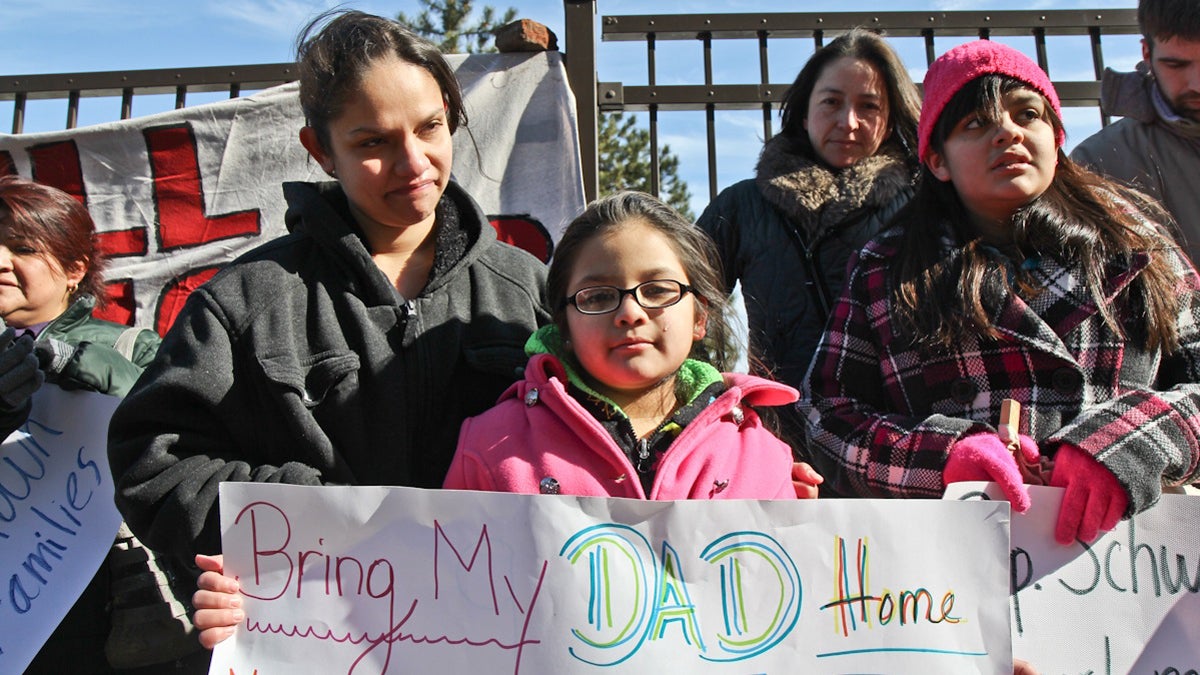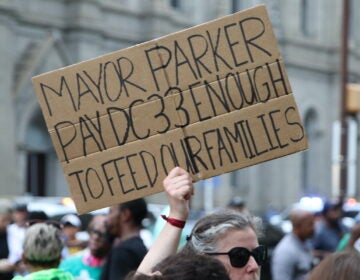Hunger strike draws closer look at deportation
Listen
Pilar Molina and Caitlin Resindez are the wife and daughter of Isreal Resendiz-Hernandez, a Norristown shop owner who was detained for deportation on Jan. 27. (Kimberly Paynter/WHYY)
Three immigration detainees being held in central Pennsylvania have been on a hunger strike to protest their continued detention and possible deportation. There have been protests by their family members in Philadelphia and elsewhere.
“NewsWorks Tonight” guest host Mary Cummings-Jordan spoke with WHYY’s Emma Jacobs about the impact the demonstration has had.
Mary Cummings-Jordan: Emma, thanks for joining us. Where do things stand?
Emma Jacobs: So as of this morning, Immigration and Customs Enforcement tells me that two of the three men who started this hunger strike are now accepting meals.
I’ve been told that at least two other men had joined them but ICE won’t give me a yes or no answer on that without their names. It looks like there was some sort of response in York — the detention facility where they were originally being held — the three were pretty quickly split up to three different jails in Pennsylvania.At least one of the men, Israel-Resendiz Hernandez, was taken to the hospital yesterday as a precaution, according to his lawyer.
His wife actually got briefly arrested and detained this week in Washington with a bunch of immigration activists —
MC: What’s really going on here? These men are in the country illegally, right? So what ground do the advocates stand on?
EJ: Yes. It’s, simply put, a publicity stunt. This is a strategy that’s evolved among activists, is bringing a lot of media attention to particular cases with the hope that ICE will exercise the discretionary power it does have to essentially put deportation cases aside and let the defendants stay for now. Parts of their story are sympathetic. They have families, some American-citizen children, and they work.
The media attention definitely has affected how some cases have been treated around the country. It’s not clear to me what will happen in these cases — partly because these guys have some points against them from ICE’s perspective — which I’ll get into.
MC: Emma, why has there been so much activity around their cases as there has been — with individuals and advocacy organizations really behind this?
EJ: I think part of the reason is they had some friends in the activist community. But also: Over the last couple of years under the Obama administration, Immigration and Customs Enforcement has been very public about directing more of their resources to deporting what they consider priority offenders. And part of that equation is really straight-forward — they’re trying to deport aliens who have committed crimes, and percentage of criminal aliens has gone up — though there are some questions about who’s considered a criminal and whether the lines they’re drawing are ones that would make sense to the general public.
But I think that immigrants in the country illegally have really taken this to heart. They think that if they stay on the right side of the law, immigration will and should leave them alone.
MC: And have these guys been on the right side of the law?
EJ: The families say these guys aren’t criminals. I looked them up in Montgomery County, where they live, and that seems to be mostly true. One of the names brings up a DUI from 10 years ago, but the records also show a couple people in the county with his name.
But the other big category for immigration is repeat immigration — people who got deported and then came back. Part of that is probably meant to be dissuasive, sort of a “get out and stay out,” but also back in the ’90s the U.S. criminalized a lot of what had previous been considered civil offenses.
ICE told me that all three of them on the hunger strike had prior deportations. That makes them felons, which the government has been pursuing more actively since the 1980s.
And I think that’s been harder criminal category for immigrant communities to make sense of. A lot of people have crossed the border more than once. Some were turned back for the first time at the border, like one of the people who was refusing food. Israel Resendiz-Hernandez’s prior deportation, according to his family was actually after he had left the country to see his dying father and then tried and was discovered by border patrol in Arizona when he reentered the United States and sent back. He later came back — so he has this prior deportation on his record but I think that his family and friends have a lot of trouble accepting that’s a reason he should be deported.
He’s also filed paperwork saying he’s afraid for his safety if he’s deported so that’s another thing the government will have to work through.
MC: What’s their status now, and what do you expect to happen in the near future with their cases?
EJ: It’s not clear. Media coverage can really be a little bit of a wild-card in immigration cases. One of these guys has also filed paperwork saying he’s afraid for his safety if he’s deported, so that’s another thing the government will have to work through.
An earlier version of this post gave an incorrect date for when returning to the U.S. after deportation was made a felony.
WHYY is your source for fact-based, in-depth journalism and information. As a nonprofit organization, we rely on financial support from readers like you. Please give today.




